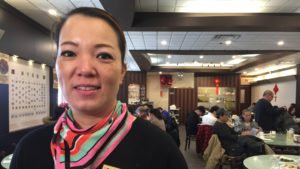Vandalism, thefts and internet, phone scams are on the rise in the neighbourhood

Anna Chen has tried to reason with a panhandler who approaches her customers outside House of Gourmet, the busy restaurant she manages in the heart of Chinatown, at Spadina Avenue and Dundas Street West.
“We talked to her so many, many, many times but she just doesn’t want to leave,” Chen told CBC Toronto.
She’s also seen so much vandalism, such as graffiti, that Chen is resigned to thinking of the spray paint as just part of her neighbourhood.
“You can’t stop them,” she sighs.
Not once has she ever thought to call the police.
“I think they are very busy dealing with all the crime and everything, so we don’t want to bother them.”

Starting Monday, Toronto police are launching an initiative in Chinatown to get residents and workers like Chen to feel more comfortable alerting officers to crimes in their neighbourhood.
“They just don’t call the police,” Staff Sgt. Matt Moyer of the 52 Division Community Response Unit told CBC Toronto.
“They feel a little bit intimidated. They also don’t want the attention, they’re not sure if they’ve done something wrong.”
Project Blue Dog, named for the Year of the Dog on the Chinese zodiac, is a 10-week program run by police from 52 Division.
This year marks the eighth consecutive year a project of this sort has run in Chinatown, but Moyer says this year police are taking a closer look at the community after they found a spike in Internet and phone scams, which were going unreported, as well as vandalism and thefts from cars.

But the new project is not about wracking up arrests. Instead, it’s about “high-visibility” community policing, says Moyer.
“We have a big, big hurdle to deal with by convincing these people, just through our conversations, that we actually want their phone calls, we want them to call us, we want them to report,” he said.
“Don’t tell me you’ve arrested 100 people — if I don’t feel safe going to my car at night, something’s wrong.”
More police officers will be put on the ground in the area, some of whom are “designated neighbourhood officers” who speak Mandarin or Cantonese and know the businesses, explains Moyer.
“I’ve been doing this a long time and I think it’s all about relationships,” he said. “You cannot be shy as a policeman. You have to initiate the conversation … You have to take that step because it’s relationships that are going to change people’s minds and get people trusting you.”
CRA scam impacting seniors
A “classic” fraud making its way through the community, Moyer says, is a scam involving people who pose as employees from the Canada Revenue Agency.
Scammers will use emails, phone calls and even text messages to get money and personal information.
Often the phone calls seem urgent and the scammers will use aggressive language or threats to scare people into making payments. Moyer says this “voice of authority” intimidates people, especially seniors who may have a language barrier.
‘Crimes of opportunity’
Another issue highlighted by the initiative is an increase in “crimes of opportunity” like theft from cars and vandalism, and the potential for a rise in pickpockets as the weather warms up and tourists flock to the area, said Deputy Chief Peter Yuen at a news conference to launch the project on Monday.
On Apr. 21, police and community members will take part in a graffiti clean up day, with the city providing supplies.
After hearing about the project on Monday, Chen was asked if she will start calling the police more, but she’s hesitant.
“Maybe tonight if we do see something we probably will just call the police,” she said, but then laughed and changed her mind again. “If they are really busy, I just, I can call still, but I just don’t want to bother them.”
What she really wants for the upcoming tourist season is “a safe neighbourhood,” and she says she is looking forward to seeing more police in the area.


